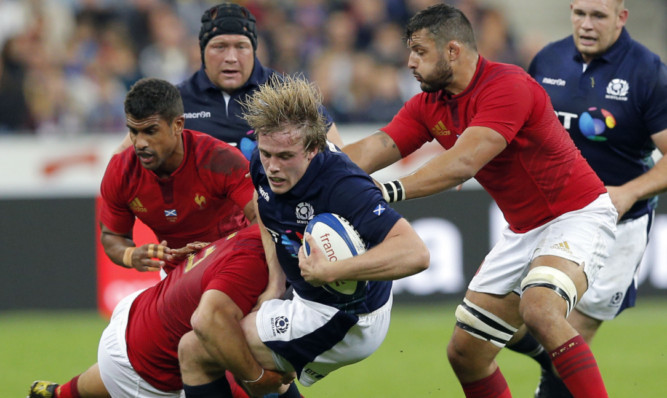Scotland captain Greig Laidlaw said that Saturday night’s narrow 19-16 loss to France in Paris felt just as sore as any Six Nations loss.
In the heat of the frenetic finish, with surely victory just one composed pass away, it might have felt that way to the players. But really, on sober reflection, it wasn’t.
It would have been nice to win in Paris for the first time since 1999, but this was a World Cup warm-up match. If it had been February, it would have been a really sore one. If it had been the Rugby World Cup game against South Africa, it would have been excruciating.
There’s two matches upcoming later this month against the might of Japan and the USA that are far more important to Scotland than this one. The relative importance of the contest was illustrated by two incidents in the match, one barely noticed and one very much debated among the Scotland support as they headed back to the city to burn the midnight oil.
The first was the early departure of Alasdair Dickinson after he took a head knock clashing with Mathieu Basteraud 15 minutes into the game. The loose head prop, now among the best in his position in Europe, is absolutely crucial to Scotland’s RWC campaign.
It may have been he failed the head injury test, although Vern Cotter said he was sprightly enough in the dressing room. But the inference was clear; the former Dundee HSFP player wasn’t to be risked in any way whatsoever with more important business to come.
The second example was Scotland choosing to run a penalty in injury time rather than take the easy kick that would have drawn the game; a team decision, said Laidlaw, fully backed by Cotter.
Had it been the Six Nations, they would have kicked it, no doubt. Had it been the World Cup, obviously they’d have kicked and played for extra time.
But this was a warm-up game; a fully engaged and physical one, perhaps, but I don’t think I’d have counted a win in the same breath as the famous 1995 and 1999 Paris victories, would you?
That win’s for the future, and if France keep underestimating Scotland like this then it might not be long in coming. In the meantime, it was hard for even the most hard-hearted observer to find too many negatives in Saturday’s performance by Scotland.
The art of international rugby, certainly for Scotland it seems, is comparable to patching up a leaking dyke. Leaks occur, are addressed, but once they’re patched up the water squirts out another place.
In the opening couple of warm-up games in Dublin and Turin Scotland’s scrum and aerial game were poor. Both, on Saturday’s evidence, have been corrected.
Even when Dickinson went off, Gordon Reid showed he was up to the job in the scrum. At the death, with France attempting to grind Scotland into the appallingly substandard Stade de France turf, the front row that struggled in Dublin Reid, Fraser Brown and John Welsh held firm.
The aerial game has been solved by the return of Tommy Seymour and Sean Maitland, who despite a lack of action for months rather than weeks both ticked their names on the first-choice XV team sheet. Maitland, playing his first game for seven months, was outstanding in attack and in defence.
However, no sooner have these deficiencies been solved than another popped up, in the lineout of all places; the setpiece where Cotter’s influence has been the most positive since his arrival.
It may have been that the French had just done their homework, targeting not so much Ross Ford’s throw but the Scots’ protection of the ball once won or at point of contact. Greig Laidlaw complained long and hard to Wayne Barnes about interference, but the English referee was none too sympathetic to the Scots all night.
Sometimes the French just did a good job, such as when Dimitri Szarzewski read the long throw to the tail which set up position for France’s winning score.
South Africa will have noted it with relish, but if anything it was ideal that any deficiencies or transparency in the Scottish lineout scheme were spotted now; they’ve got three weeks to sort it, and will have kept back a good bit of their strategy anyway.
For the most part Scotland looked like a resilient and competitive team. John Hardie is a dynamo at openside and even given John Barclay’s excellence for Scarlets at Scotstoun, I’d still see him as a back-up No 8 rather than an alternative at 7.
Finn Russell had the shackles on a little, but he again showed plenty and outplayed his illustrious opposite number, Freddy Michalak. Scotland have the speed to strike over the length of the field as Seymour did for his try and Mark Bennett has the creativity to break down defences, as he almost did at the end.
That incident, and Matt Scott’s wayward pass when he had players queuing up to score, will be the could-have, should-have we’ll remember from this game. But even that can be a lesson learned.
If Scotland get in the same situation in the World Cup, as they probably will, one can hope that composure under pressure and fatigue – when it actually matters most – will bring the right result.
